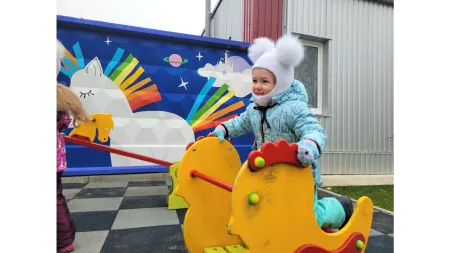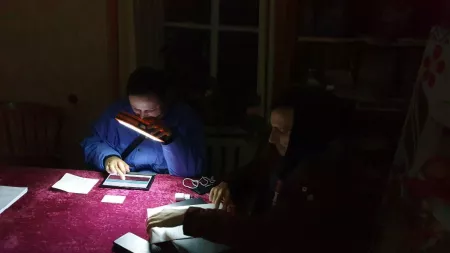A loud snap and the café is completely dark. The few people sitting with their evening coffees do not react but remain sitting. A waiter brings a candle over to one of the tables. My group also continues talking in the light of the candle, until one by one the visitors gets up, puts on their warm winter coats, thanks the employees, and goes out into the icy cold dark streets of Lviv. Outside I can see that there are no streetlights turned on, the traffic lights are also dark. Some restaurants across the street still have a few lights on. I can hear the constant hum of the generator that is producing the electricity for them. With about 50% of energy infrastructure destroyed, power outages have become a daily occurrence in Ukraine. Some areas have planned power cuts in order to not overload the systems. The first thing people say to me when I visit their shelters – in cellars, office spaces or even in the huge football stadium of Lviv – “Sorry, but we do not have electricity at the moment.” I walk up dark staircases and along dark corridors. A young family in a cellar brings out the torches. The people have gotten used to it. One father says to the question how he lives under these difficult circumstances with, “I am just happy that we are able to live in safety. We have everything we need here. Better to have no electricity than bombs and being shot at.”
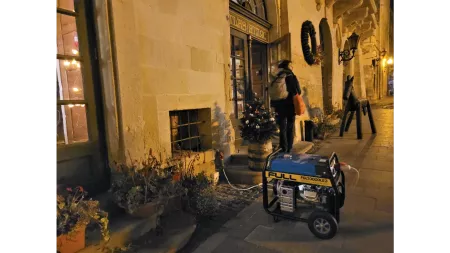
Icy cold wind at the train station
The temperatures are dropping in Ukraine, the board at the Lviv train station says - 1°C, my weather app is telling me with wind chill that it felt like - 7°C. The icy wind howls through the train station, and I pull my scarf higher to keep warmer while we talk to the volunteers that still work here after nearly 10 months since the war escalated in February this year. I stood here eight months ago and can remember the tents and long lines on the square in front of the train station. Valentin, a coordinator, who helps the elderly, sick and people with disabilities that arrive on evacuation trains from the East, also remembers, that it took him up to 1.5 hours to get through all of the people. “Now its only a few hundred that arrive every day”, he tells us. One of the volunteers here is 6 years old. Vasilina helps by pushing the many wheelchairs that wait for occupants. In one corner of the arrival hall boxes full of winter clothes are waiting to be sorted by the volunteers. They are desperately needed in this weather, especially now that the energy infrastructure is being targeted. Without electricity the heating pumps for radiators do not work. The new arrivals often only brought a small bag with them because that is all they could pack in their hurry to safety.
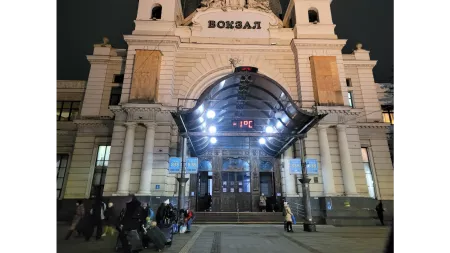
Unforgettable statements
I met one young girl in a shelter who didn’t even bring a jacket with her from home. These are the statements that let me take a deep breath. Talking to people who have gone through the worst traumas and who have been living in shelters for a very long time now, is not easy. Some statements will always stick with me, such as from a psychological counsellor in a facility for men with mental disabilities: “We do not know where most of them are from, or where their family is. They do not want to talk about what happened to them. They are alone here.” A family, two sisters with three young children, tells me that they lived in a non-government-controlled area for 5 months and had to decide between sending their children to a school or losing them altogether, so they fled – through 50 checkpoints, not knowing if the next checkpoint might be their last.
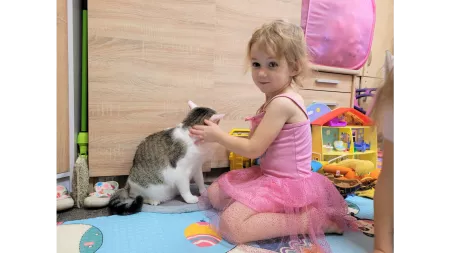
A happy reunion
Among all these stories there are also some happy moments. Revisiting a shelter that I also visited in August was one of those. When I was there the shelter was being extended. A big construction site was building new rooms for more displaced families. CARE and its partners supports this shelter with furniture, kitchen appliances and mattresses. Seeing this finished and seeing children playing on the finished playground was a special moment for me. Seeing what donations can do and how they make a difference to families every day. I also met Leona again, who is the administrator of the shelter. We embraced and it was as if I was seeing a long-lost friend. She tells me, that she is happy that they were able to take in more families, but she also tells me that they are already full again. Showing that the need for a place to sleep is still very high and that the people, the families, the children arriving without jackets, the elderly and the sick receive the support they need.
